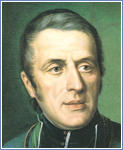 Saint Eugène de Mazenod was born in 1782 in Aix-en-Provence, France, on the verge of the French Revolution. His father was of nobility, his mother from a rich family. At age eight, the young Eugène had to flee in exile because the revolutionaries wanted to kill the children of the nobles. His exile lasted for eleven years. IN Venice he was taken in by an exemplary family, the Zinelli’s. “It was there that I discovered my vocation to the priesthood.” In Palmero, at the court, he had his share of worldly riches. He wanted to restore the family fortunes by marrying a young rich woman. But he increasingly lost his taste for worldly pleasures.
Saint Eugène de Mazenod was born in 1782 in Aix-en-Provence, France, on the verge of the French Revolution. His father was of nobility, his mother from a rich family. At age eight, the young Eugène had to flee in exile because the revolutionaries wanted to kill the children of the nobles. His exile lasted for eleven years. IN Venice he was taken in by an exemplary family, the Zinelli’s. “It was there that I discovered my vocation to the priesthood.” In Palmero, at the court, he had his share of worldly riches. He wanted to restore the family fortunes by marrying a young rich woman. But he increasingly lost his taste for worldly pleasures.
It was on Good Friday, 1807, then twenty-five, that Eugène encountered Christ and recognized him as his saviour. “My soul aspired for its ultimate end, God, the unique Good the loss of whom I keenly felt.”
At the age of twenty-six Eugène entered the seminary at Saint-Sulpice in Paris. His aim was clear: “to be a servant and priest of the poor.” He was ordained a priest in 1811.
The bishop asked himself what he was going to do with such a strong-minded and impetuous young aristocrat. He was relieved when de Mazenod asked him to let him work with the poor and abandoned.
We also worked with prisoners and preached in rural areas in the common language of the people. In 1815, he felt the need to have companions who would share his apostolate, who would live in community with him, and who would commit themselves through religious vows.
On January 25th, 1816, Father de Mazenod and four other confreres consecrated their lives to God and went to carry the Good News to the poor. In 1826, the society took the name of the Missionary Oblates of Mary Immaculate.
Eugène de Mazenod became bishop of the Marseilles, France in 1837 and his influence extended not only locally but throughout the world. At the time of his death in 1861, his religious congregation numbered 417 members. On Mission Sunday, October 19, 1975, Eugène de Mazenod was beautified by Pope Paul VI. On December 3, 1995 he was canonized by Pope John Paul II and is now a man of holiness recognized by the entire church.
Saint Eugène de Mazenod was a witness in his times. Eugène, our founder, was an eloquent, principled, relentless, impulsive, generous, intuitive and sensible man ahead of his times. On his death bed, he left to his Oblates throughout the world a humble and spiritual testimony in these words: “Practice among yourselves charity, charity, charity, and zeal for the salvation of souls beyond.”
Our Rule
We coordinate our missionary activity with the overall pastoral plan of the local Churches where we work, and we collaborate in a spirit of brotherhood with others who work for the gospel. (Constitution 6)
It is in an apostolic community that the Oblates accomplish their mission to proclaim the reign of God. This radical demand of the Gospel is manifest in their religious vows.
Through the vow of poverty, Oblates hold everything in common. Animated by the Spirit who led the first Christians to share everything, they adopt a simple life where everyone contributes to the support and apostolate of the community.
Through the vow of obedience, Oblates listen to one another in fraternal love. As personas who live in community, they have the responsibility to seek and respond to the desire of God, manifested in the cooperation with their chosen superior. On February 17, 1826, Pope Leo XII formally approved Constitutions and Rules of the Congregation of the Missionary Oblates of Mary Immaculate. In 1982, the Oblates revised the Constitutions and Rules in order to adapt them to the needs of today. These are some of the highlights:
